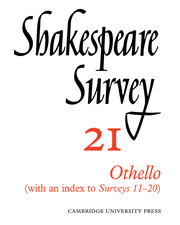Book contents
- Frontmatter
- ‘Othello’: A Retrospect, 1900–67
- The Two Parts of ‘Othello’
- ‘Othello’: A Tragedy Built on a Comic Structure
- ‘Othello’ and the Pattern of Shakespearian Tragedy
- ‘Othello’, ‘Lepanto’ and the Cyprus Wars
- Iago—Vice or Devil?
- Thomas Rymer and ‘Othello’
- Delacroix’s Tragedy of Desdemona
- Verdi’s ‘Otello’: A Shakespearian Masterpiece
- William Hervey and Shakespeare’s Sonnets
- Imagery and Irony in ‘Henry V’
- Shakespeare and the Actors: Notes towards Interpretations
- The Year's Contributions to Shakespearian Study 1 Critical Studies
- 2 Shakespeare’s Life, Times and Stage
- 3 Textual Studies
- Index to Volume 21
- General Index to Volumes 11–20
- Plate Section
‘Othello’: A Retrospect, 1900–67
Published online by Cambridge University Press: 28 March 2007
- Frontmatter
- ‘Othello’: A Retrospect, 1900–67
- The Two Parts of ‘Othello’
- ‘Othello’: A Tragedy Built on a Comic Structure
- ‘Othello’ and the Pattern of Shakespearian Tragedy
- ‘Othello’, ‘Lepanto’ and the Cyprus Wars
- Iago—Vice or Devil?
- Thomas Rymer and ‘Othello’
- Delacroix’s Tragedy of Desdemona
- Verdi’s ‘Otello’: A Shakespearian Masterpiece
- William Hervey and Shakespeare’s Sonnets
- Imagery and Irony in ‘Henry V’
- Shakespeare and the Actors: Notes towards Interpretations
- The Year's Contributions to Shakespearian Study 1 Critical Studies
- 2 Shakespeare’s Life, Times and Stage
- 3 Textual Studies
- Index to Volume 21
- General Index to Volumes 11–20
- Plate Section
Summary
Much of the criticism of Othello in this century has been marked by an uneasiness which was first voiced by Bradley. This was partly a consequence of his endeavour to discover and define the ‘substance’ of a Shakespearian Tragedy. Unable to deny that Othello was a masterpiece, and that if we are to distinguish certain of Shakespeare’s tragedies as ‘the great tragedies’ we must place Othello among them, he had in honesty to recognize that the vision of the world given by Othello did not conform to his conception of the vision of the world that the great tragedies present. It is really impossible to see in the destruction of Othello and Desdemona ‘a world travailing for perfection, but bringing to birth, together with glorious good, an evil which it is able to overcome only by self-torture and self-waste’; and Bradley made no attempt to persuade himself or us that at the end of Othello we are presented with a world that has, though at a fearful cost, purged itself of evil. On the contrary, he came very near to saying that the impression the course of the play makes on us is of a very different vision of the universe, suggesting that if there are powers outside the wills of men that shape human destinies then these powers are on the side of Iago. Shying away rapidly from this painful notion, he attempted to analyse why ‘some readers’, while acknowledging the play’s power, and even owning that dramatically it is perhaps Shakespeare’s greatest triumph, still ‘regard it with a certain distaste’, or ‘hardly allow it a place in their minds beside Hamlet, King Lear and Macbeth’. The distaste he ascribed to the repulsiveness of the subject of sexual jealousy ‘treated with Elizabethan fulness and frankness’, and to the violence and brutality to which his jealousy drives Othello.
- Type
- Chapter
- Information
- Shakespeare Survey , pp. 1 - 12Publisher: Cambridge University PressPrint publication year: 1969
- 1
- Cited by

